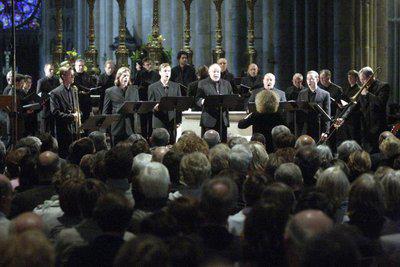


The Boston Camerata returns to one of the great masterpieces of Medieval musical art, the monumental Messe de Notre Dame of Guillaume de Machaut (ca. 1300 – 1377). Under Anne Azéma's direction, Camerata's current production first took shape as 2011 commission from the music festival of Reims, France, in commemoration of the Reims Cathedral's eight hundredth anniversary. The great cathedral where Machaut spent his ecclesiastical career was the locus of Camerata's performance, which incorporated, besides the mass setting, additional polyphony by Machaut, and a complete Gregorian chant cycle (proper) of prayers to the Virgin Mary. This new production is informed by recent musicological/historical research.
Machaut's setting of the Mass ordinary (Kyrie, Gloria, Credo, Sanctus, Agnus Dei, Ite Missa est) is revered as one of the earliest, if not the earliest, mass cycles from a single composer. But beyond its signifigance as a historical landmark, its musical content is of the highest caliber and most intense interest.
 Machaut was, after all, the most important French composer of the fourteenth century. The Gregorian propers of Camerata's production give Machaut's polyphony added resonance and depth, and provide a complete liturgical context for a contemporary audience.
Machaut was, after all, the most important French composer of the fourteenth century. The Gregorian propers of Camerata's production give Machaut's polyphony added resonance and depth, and provide a complete liturgical context for a contemporary audience.
Press from June 2011:
Critical response in Reims to Camerata's production, which played to a capacity audience, was enthusiastic. “A feast!” ran the headline in



